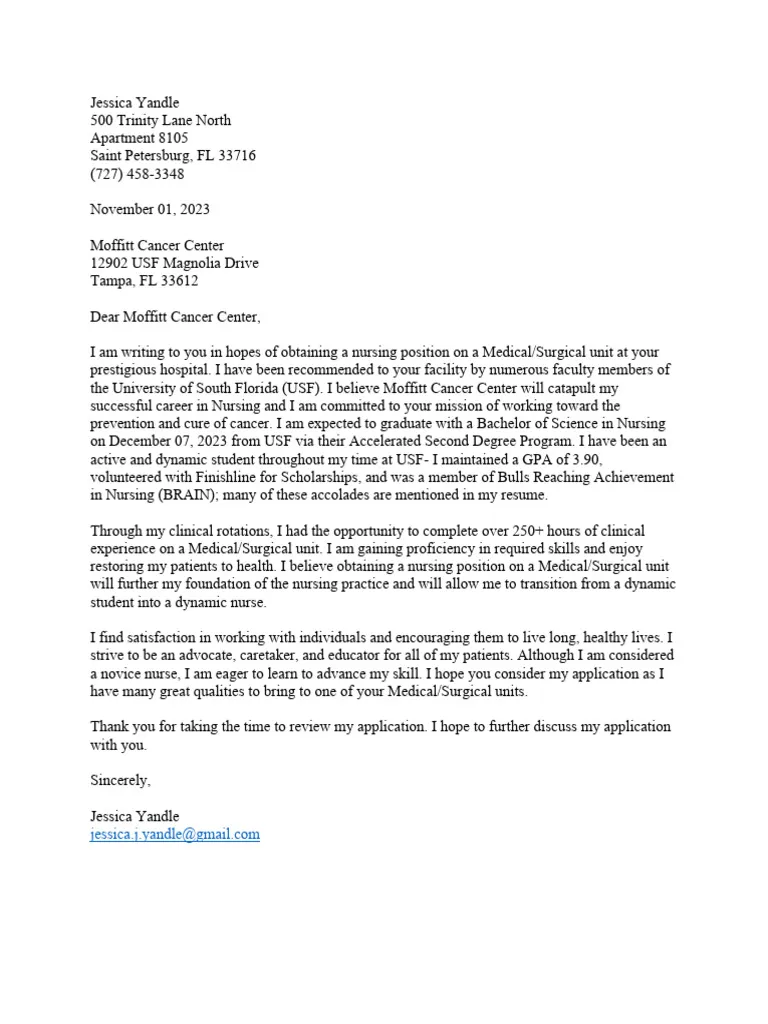Understanding the Nursing Cover Letter
A well-crafted nursing cover letter is your opportunity to make a strong first impression and showcase your qualifications to potential employers. It’s more than just a formality; it’s a crucial tool for differentiating yourself from other candidates. This guide will provide you with a comprehensive understanding of how to write a compelling nursing cover letter that grabs attention and increases your chances of landing an interview. A cover letter allows you to personalize your application, express your passion for nursing, and highlight specific skills and experiences that align with the job requirements. By following these guidelines, you can create a cover letter that effectively communicates your value and helps you stand out in a competitive job market.
Why a Nursing Cover Letter Matters
In the healthcare field, where compassion and communication are paramount, a cover letter provides a platform to demonstrate your personality and interpersonal skills beyond the information presented in your resume. It allows you to explain gaps in your employment history, provide context for your career choices, and express your genuine interest in the specific role and the healthcare organization. Furthermore, it offers a chance to showcase your writing abilities, which are essential for clear and concise documentation in nursing. A thoughtfully written cover letter can significantly increase your chances of securing an interview, as it gives hiring managers a deeper insight into your qualifications and suitability for the position.
Key Components of a Successful Nursing Cover Letter
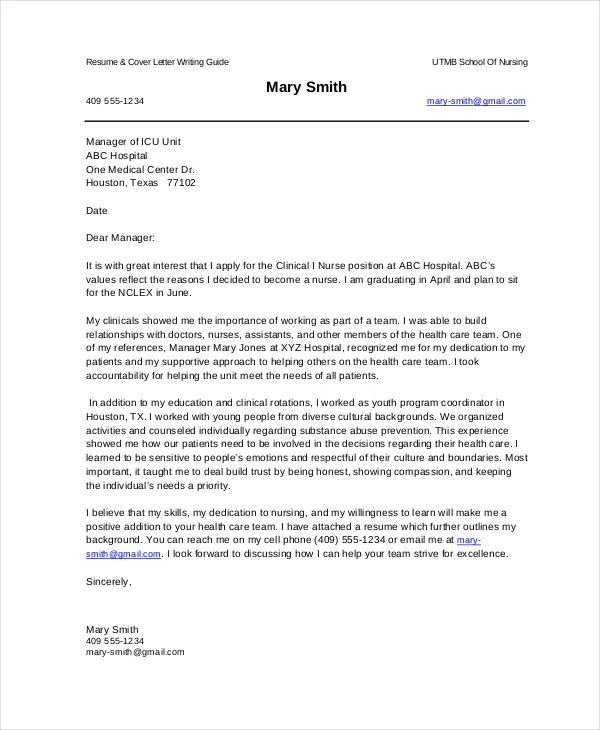
Contact Information and Date
Begin your cover letter with your contact information, including your full name, phone number, email address, and LinkedIn profile (if applicable). Place this information at the top, followed by the date. The date should be the current date, reflecting when you are submitting your application. Accuracy and professionalism in this section are crucial, as they ensure the hiring manager can easily reach you and verify the letter’s timeliness. Use a professional font and formatting that is consistent with your resume to maintain a cohesive and polished appearance. Ensure that your email address is professional and not informal; this is a reflection of your attention to detail and commitment to the application process.
Greeting the Hiring Manager
Address your cover letter to the hiring manager or the specific person mentioned in the job posting. If the name is provided, use ‘Dear Mr./Ms. [Last Name]’. If the name is unavailable, use a general greeting like ‘Dear Hiring Manager’ or ‘Dear [Department Name] Hiring Team’. Avoid generic greetings such as ‘To Whom It May Concern,’ as they can make your letter seem impersonal. Researching the hiring manager’s name shows initiative and demonstrates your commitment to the role. Always ensure you spell the name correctly and use the appropriate title. A personalized greeting immediately captures the reader’s attention and indicates that you have put effort into your application, setting a positive tone from the beginning.
Writing a Compelling Opening Paragraph
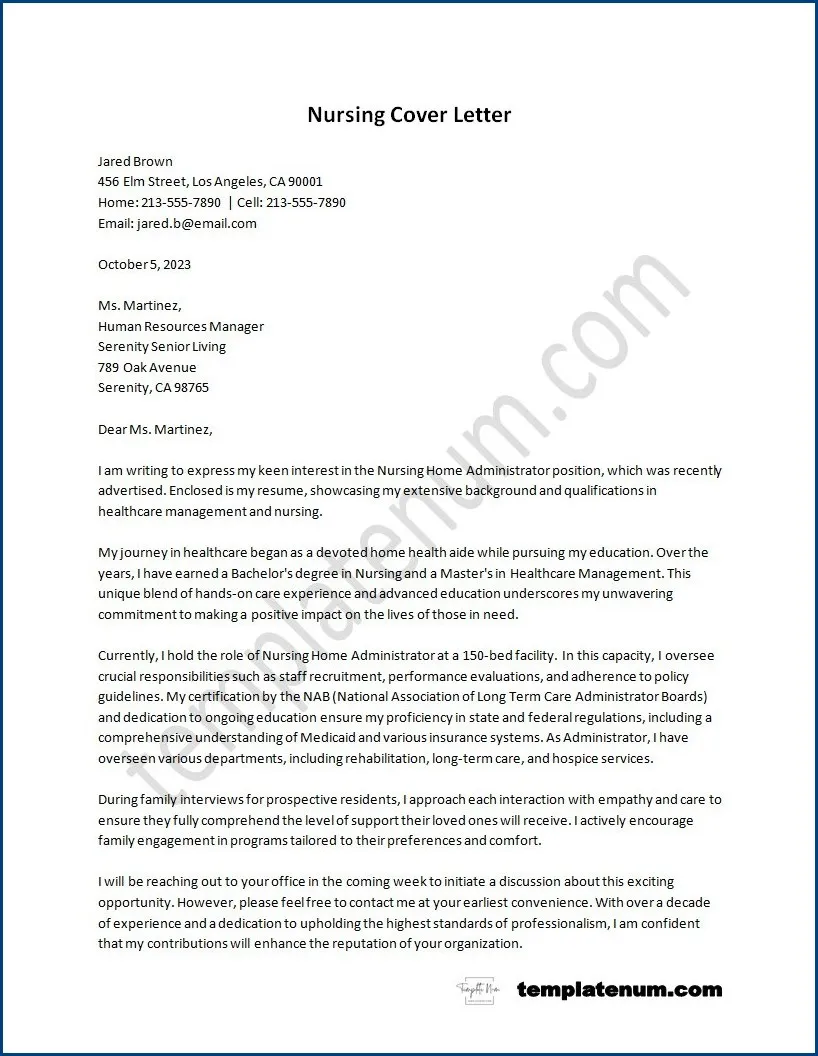
Your opening paragraph is your first opportunity to grab the hiring manager’s attention. Briefly state the position you are applying for and where you saw the job posting. Then, immediately express your enthusiasm for the opportunity and mention a key skill or experience that makes you a strong candidate. Avoid generic statements; instead, showcase your personality and passion for nursing. Clearly state your intent and quickly highlight your most relevant qualification, setting the stage for the rest of your letter. The opening should make the reader want to learn more about you, creating a strong and positive first impression and encouraging them to continue reading your cover letter with interest.
Highlighting Your Nursing Skills and Experience
The body of your cover letter should highlight your nursing skills and experience, emphasizing how they align with the job requirements. Use specific examples to demonstrate your abilities rather than just listing your responsibilities. Focus on skills that the employer has specified in the job description, such as patient assessment, medication administration, electronic health records (EHR) proficiency, and critical thinking. Showcase your clinical expertise, certifications, and any specialized training you have. Use action verbs to describe your accomplishments and quantify your achievements whenever possible. Tailor this section to each job application, ensuring you address the key requirements and demonstrating a clear understanding of the role’s demands.
Quantifying Your Achievements
Quantifying your achievements provides concrete evidence of your value and impact. Instead of saying ‘Improved patient outcomes,’ specify by how much, such as ‘Reduced patient readmission rates by 15%’. Use data and metrics to illustrate your contributions. For example, if you have experience managing a team, state the number of nurses you supervised or the results of any performance evaluations. If you implemented a new protocol, quantify the resulting improvement in patient care or efficiency. Quantitative data makes your claims more credible and demonstrates your ability to drive positive results, setting you apart from other applicants. Numbers give the hiring manager a clearer understanding of your contributions.
Tailoring Your Letter to the Job Description
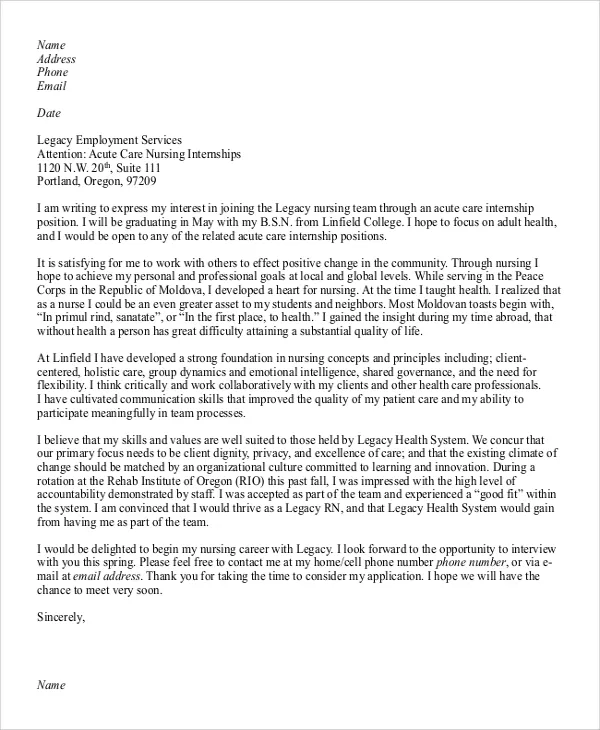
Customizing your cover letter for each job application is crucial. Thoroughly review the job description and identify the key skills, qualifications, and experience the employer seeks. Align your letter with these requirements by highlighting the relevant skills and experiences. Use keywords from the job description throughout your letter to demonstrate that you have carefully considered the role’s needs. Show how your skills and experiences fit the specific requirements and expectations of the position. This personalized approach shows the hiring manager that you have taken the time to understand the role and are a strong fit for the organization. Adapt your cover letter to match the specific needs of each job you apply for to boost your chances of success. (Image: tailoring-cover-letter.webp)
Expressing Your Enthusiasm and Fit
Expressing your enthusiasm and demonstrating your fit with the organization is an essential component of your cover letter. Clearly state why you are interested in the specific role and the healthcare organization. Mention something specific that attracts you to the role, such as the hospital’s mission, values, or a particular program they offer. Research the organization and align your values and goals with theirs. Discuss how your career aspirations align with the role and the organization’s culture. Expressing your interest in the role also highlights how you can be a great addition to the team and a strong fit for the company culture. This personalization shows that you are genuinely interested in the opportunity and not just sending out a generic application. (Image: enthusiasm-nursing.webp)
Closing Your Nursing Cover Letter
Your closing paragraph should reiterate your interest in the position and express your eagerness for an interview. Thank the hiring manager for their time and consideration. Clearly state how you can be contacted and mention that you look forward to discussing your qualifications further. Reiterate your contact information. This final paragraph should leave a lasting positive impression, reinforcing your enthusiasm and professionalism. A strong close can make a significant impact. Provide a clear call to action by expressing your desire for an interview and your availability. Thank them again for considering your application.
Proofreading and Formatting Best Practices
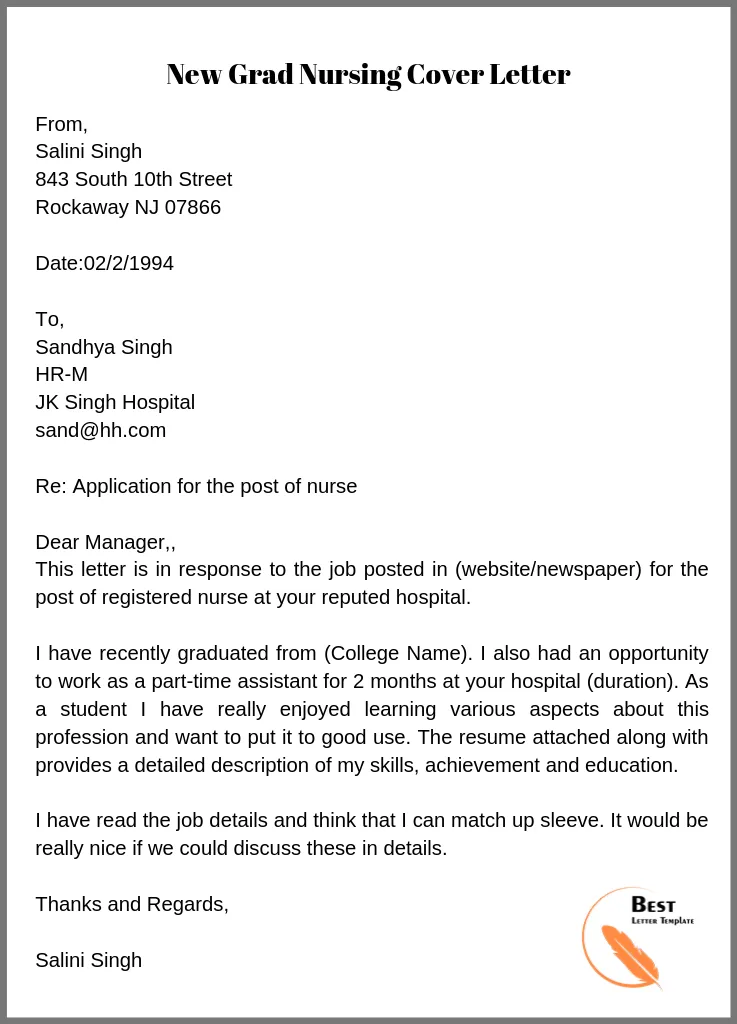
Proofreading and formatting are crucial for creating a professional and polished cover letter. Carefully review your cover letter for any grammatical errors, spelling mistakes, and typos. Ensure the formatting is consistent throughout the document, with clear headings, paragraphs, and spacing. Use a professional font such as Times New Roman, Arial, or Calibri, and maintain a font size between 10 and 12 points. Read your cover letter aloud to catch any awkward phrasing or inconsistencies. Have a trusted friend or colleague review your cover letter for a fresh perspective. A well-formatted and error-free cover letter demonstrates attention to detail and professionalism, reflecting your commitment to excellence. (Image: cover-letter-proofreading.webp)
Nursing Cover Letter Examples and Templates
Utilizing nursing cover letter examples and templates is a great way to ensure you have a well-structured and compelling letter. Several resources are available online that offer examples of cover letters tailored to different nursing roles and levels of experience. These templates can guide you in organizing your content and formatting your letter effectively. Look for examples that showcase specific skills, experiences, and achievements relevant to the positions you are applying for. Adjust the provided templates to reflect your unique qualifications and adapt the language to match your personality and style. Remember to personalize each cover letter based on the job description and the healthcare organization to increase its effectiveness. (Image: nursing-template.webp)
Using Online Resources and Tools
There are numerous online resources and tools available to help you write and refine your nursing cover letter. Websites like Indeed, LinkedIn, and various career advice platforms offer cover letter templates, writing guides, and examples. Use these resources to gain inspiration, learn about best practices, and understand how to tailor your letter to specific job postings. Many online grammar and spell-checking tools, such as Grammarly, can help identify and correct errors in your writing. Additionally, consider using online resume builders, which often provide cover letter templates and writing prompts. Leveraging these resources can save you time, ensure you are following the best practices, and enhance the overall quality of your application.
Common Mistakes to Avoid in Your Nursing Cover Letter
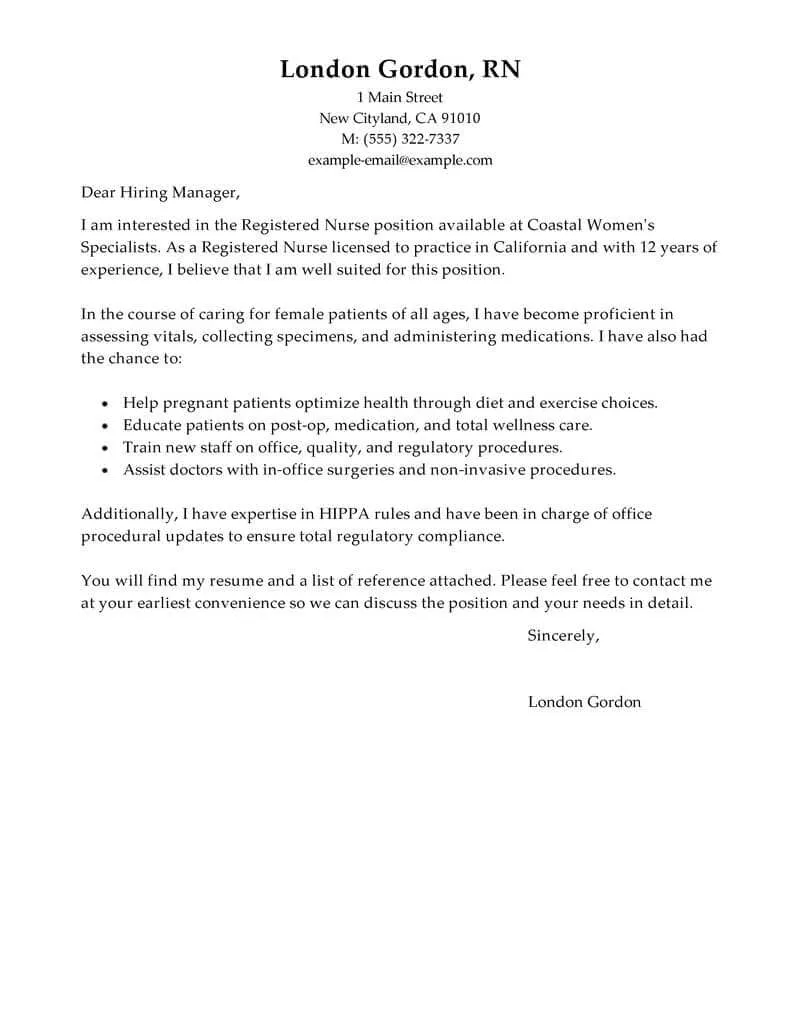
Ignoring the Job Description
Failing to address the job description is one of the most significant mistakes you can make. If you don’t demonstrate a clear understanding of the job requirements, you are less likely to be selected for an interview. This includes not mentioning the specific skills or experiences the employer is seeking, or failing to use keywords from the job posting. Carefully read the job description and tailor your cover letter to highlight the relevant skills and experience, using the language from the job posting to show that you understand the role’s demands and requirements.
Using Generic Language
Using generic, impersonal language is a major turn-off for hiring managers. Avoid using clichés and phrases that could apply to any job, not specifically nursing. Your cover letter should be tailored to each position you are applying for. Show your personality, passion for nursing, and unique skills. Generic language makes your cover letter seem less engaging and less likely to grab the hiring manager’s attention. Make each cover letter unique and show your personality by highlighting your skills and experiences.
Focusing Solely on Responsibilities
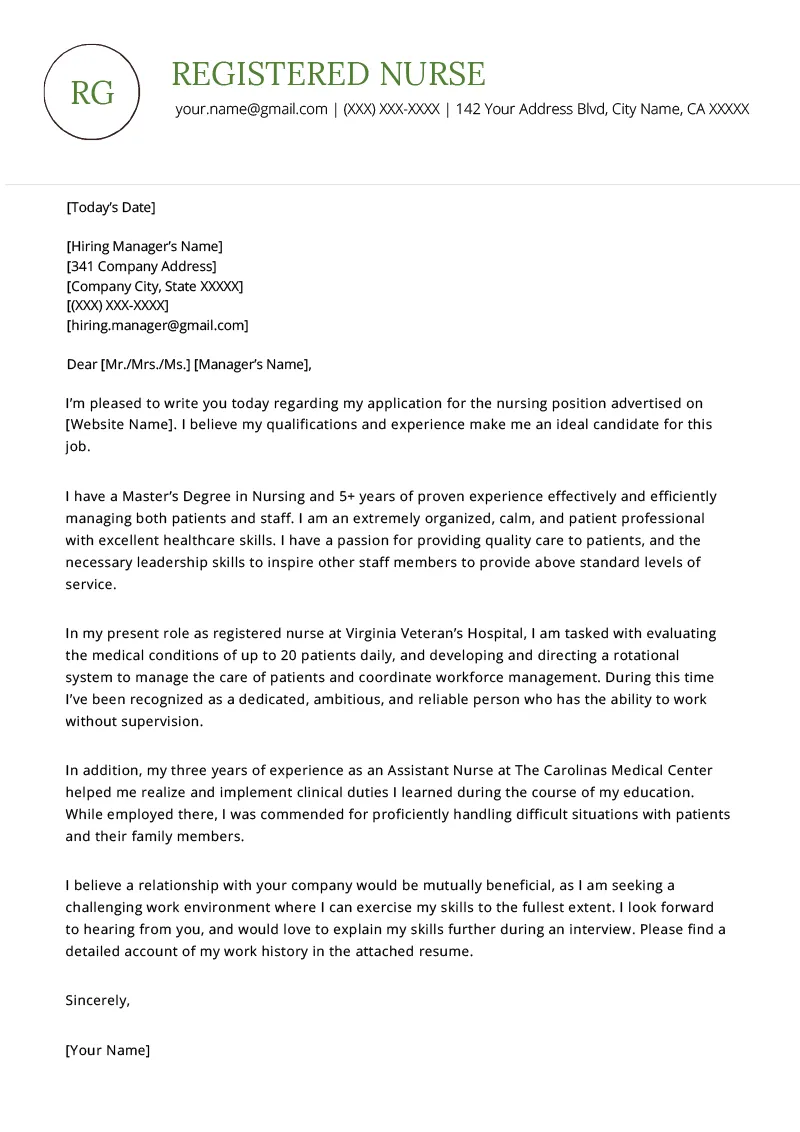
Listing only your responsibilities without highlighting your accomplishments is a missed opportunity. Your resume already lists your job duties, so your cover letter should demonstrate how you have excelled in these roles. Instead of stating your responsibilities, emphasize your achievements and quantify your results whenever possible. Provide specific examples of how you have improved patient outcomes, solved problems, or contributed to the team. Highlighting your accomplishments makes you stand out and proves your value to the employer, showcasing you can offer more than just fulfilling the basic responsibilities.
Submitting Without Proofreading
Submitting a cover letter without proofreading is a critical mistake that can undermine your application. Errors in grammar, spelling, and formatting can make you seem unprofessional and demonstrate a lack of attention to detail. These errors can make the hiring manager believe you did not take the time to put together the best application possible. Proofread your cover letter carefully to catch any mistakes. Read the cover letter aloud or have a friend review it for a fresh perspective. Double-check all names, dates, and contact information for accuracy. A polished and error-free cover letter reflects your professionalism and increases your chances of making a positive impression.
